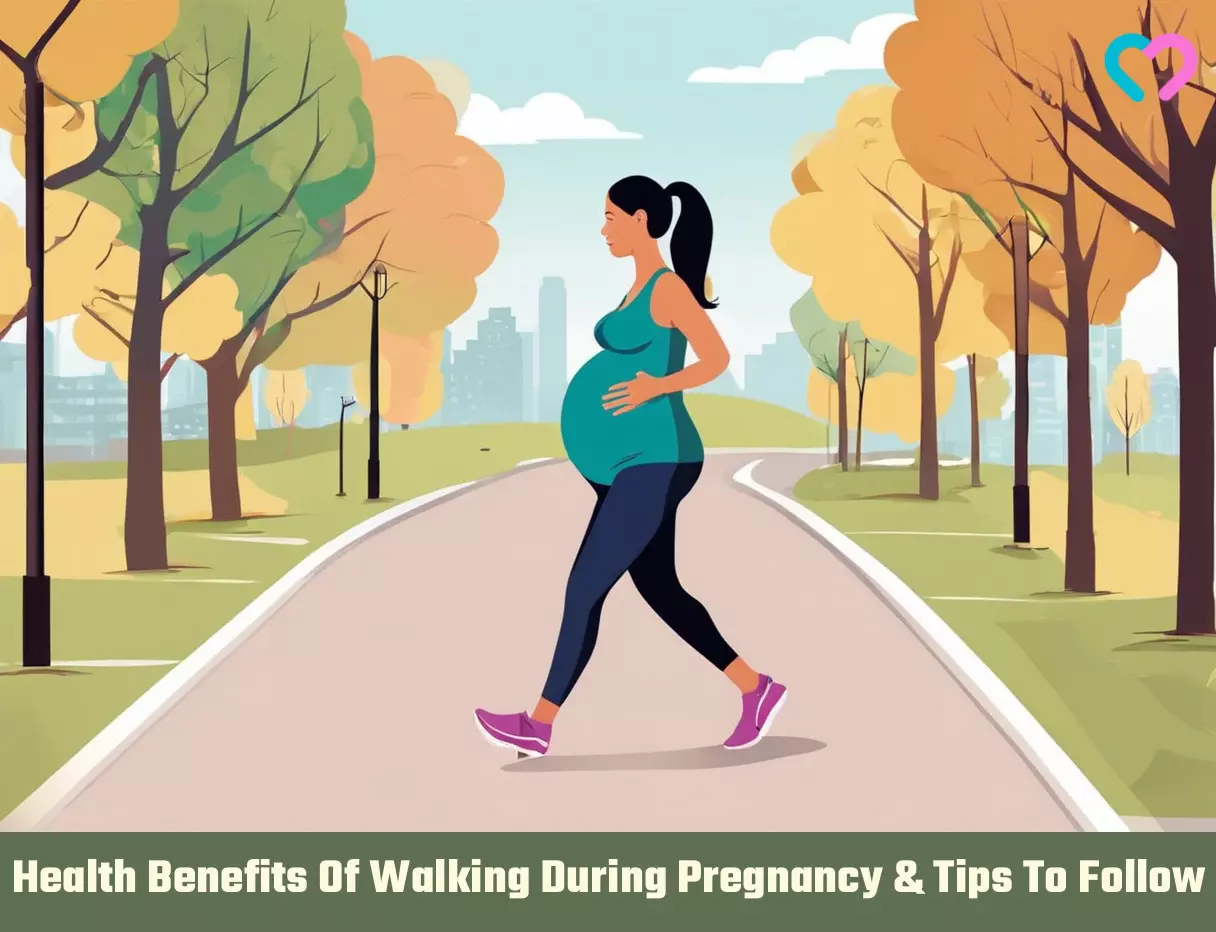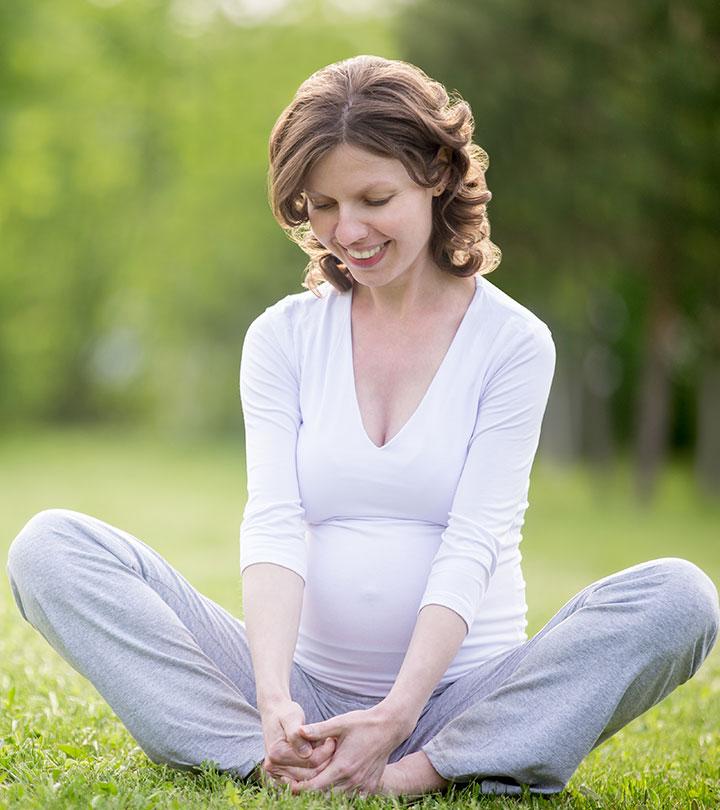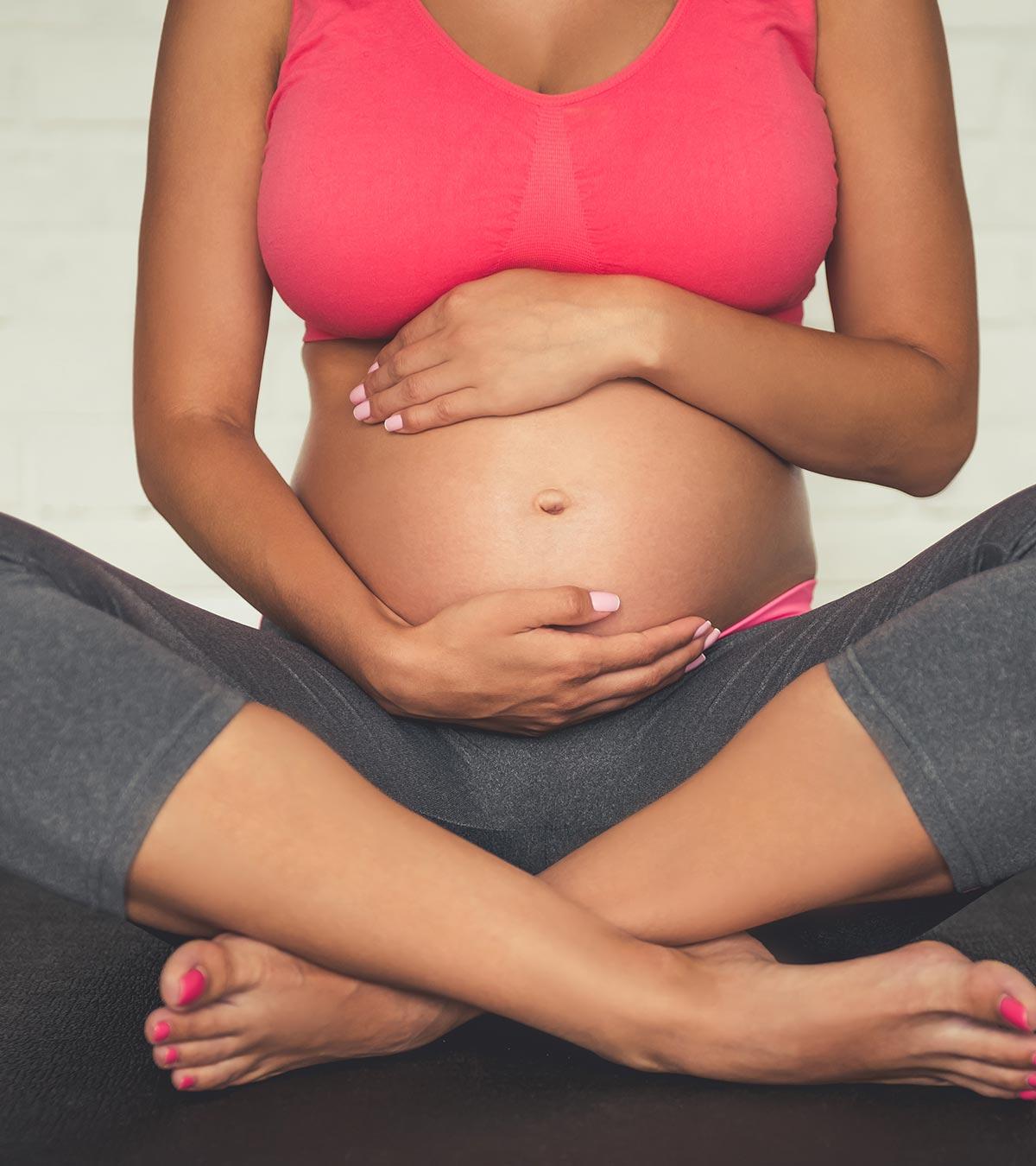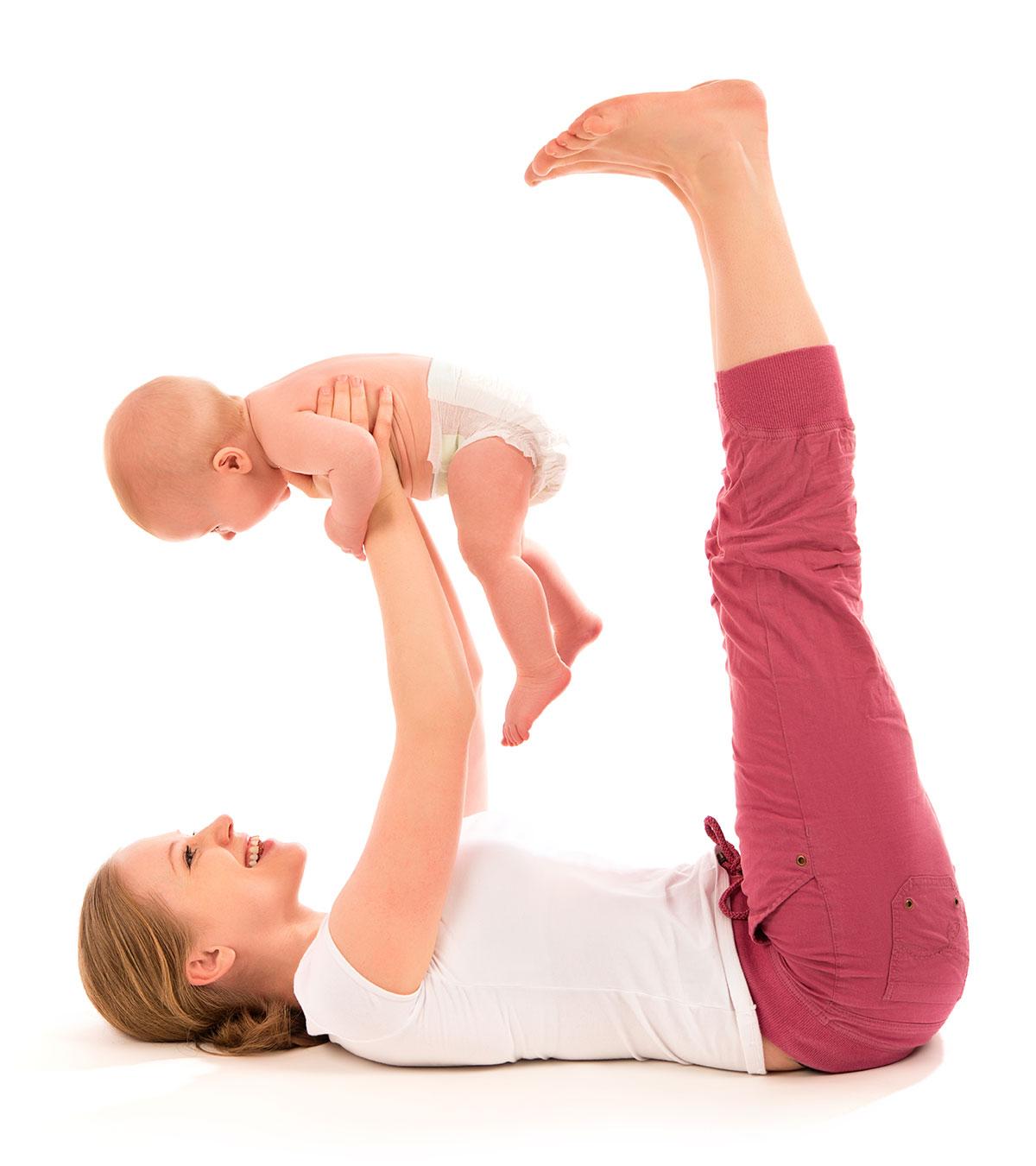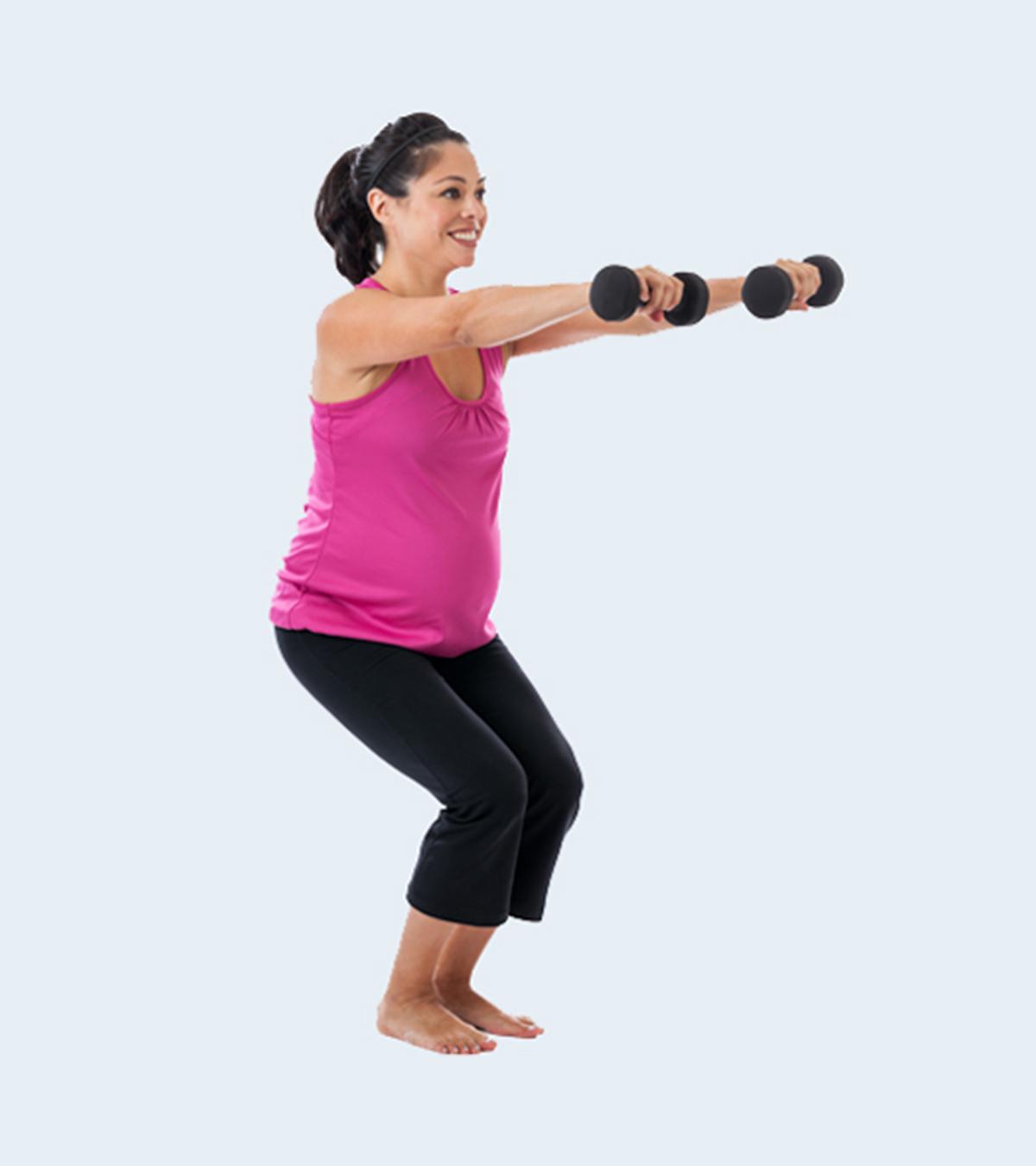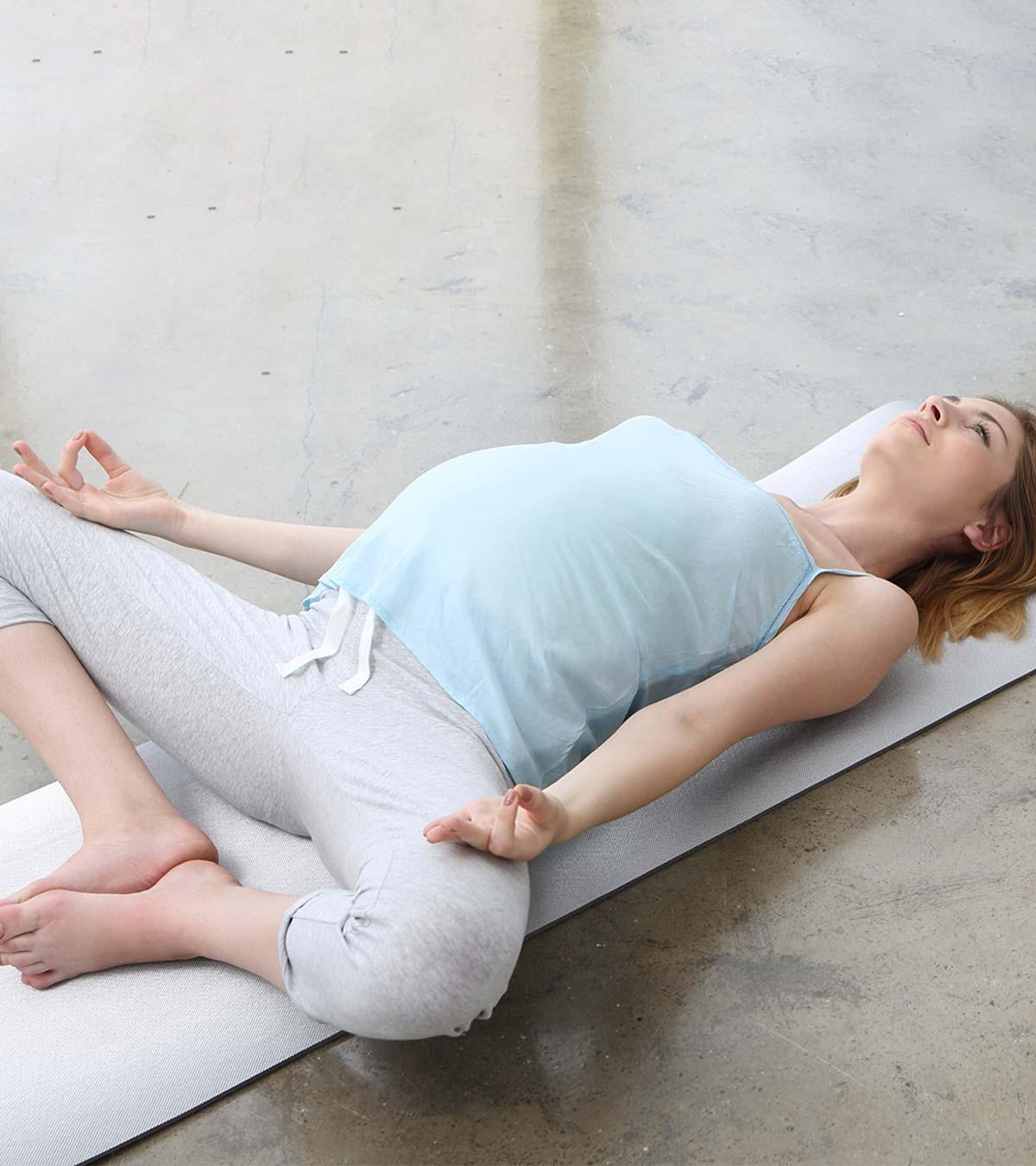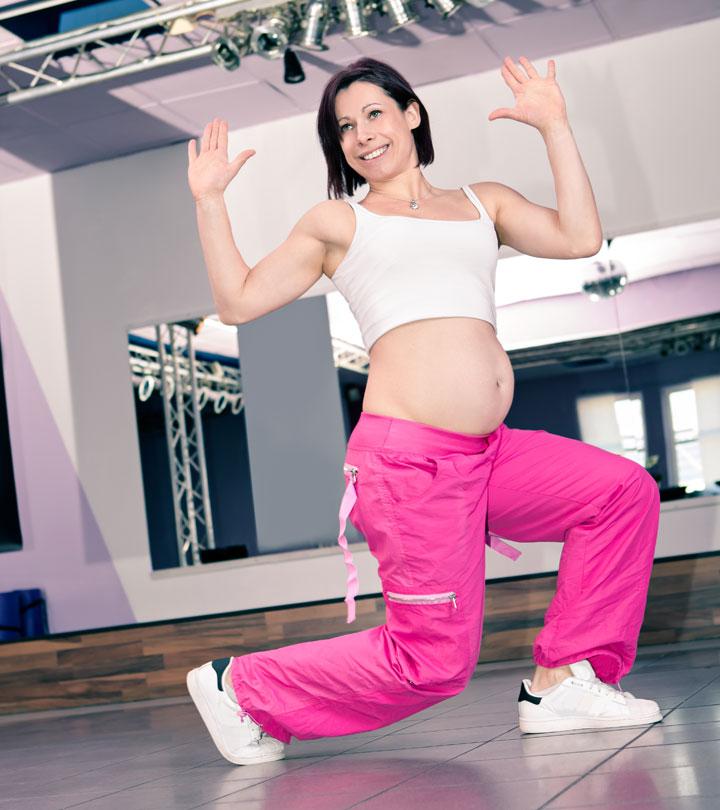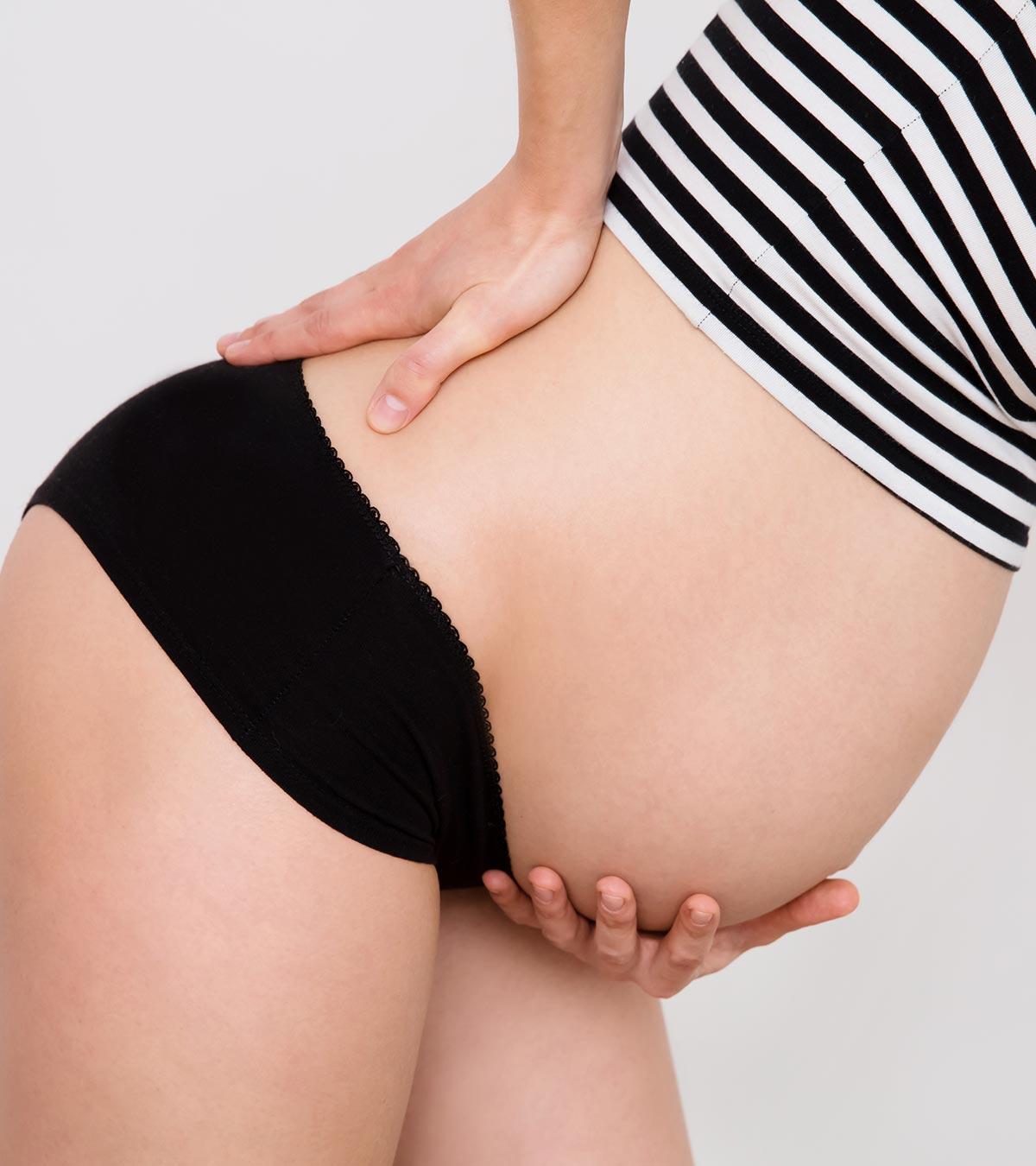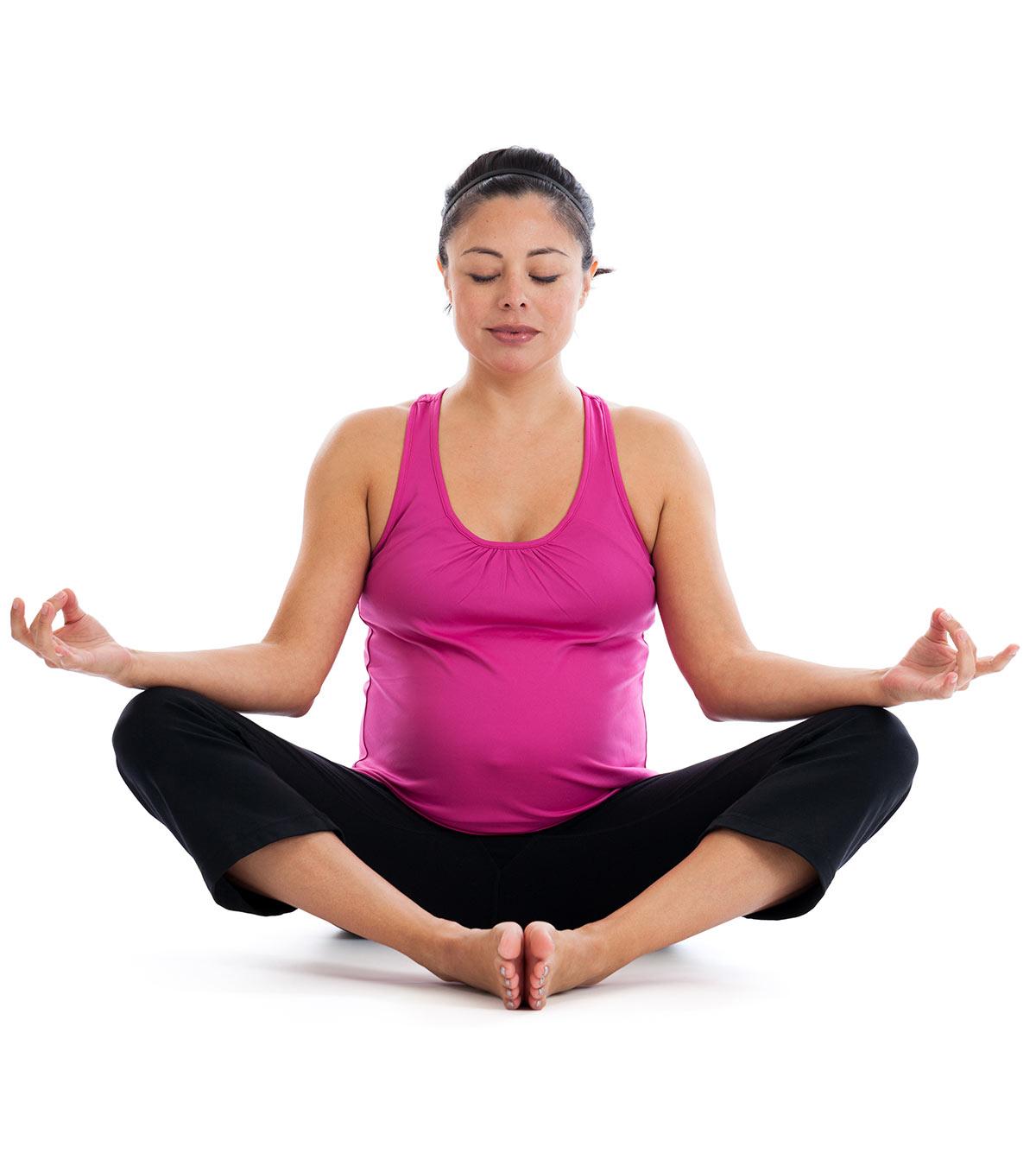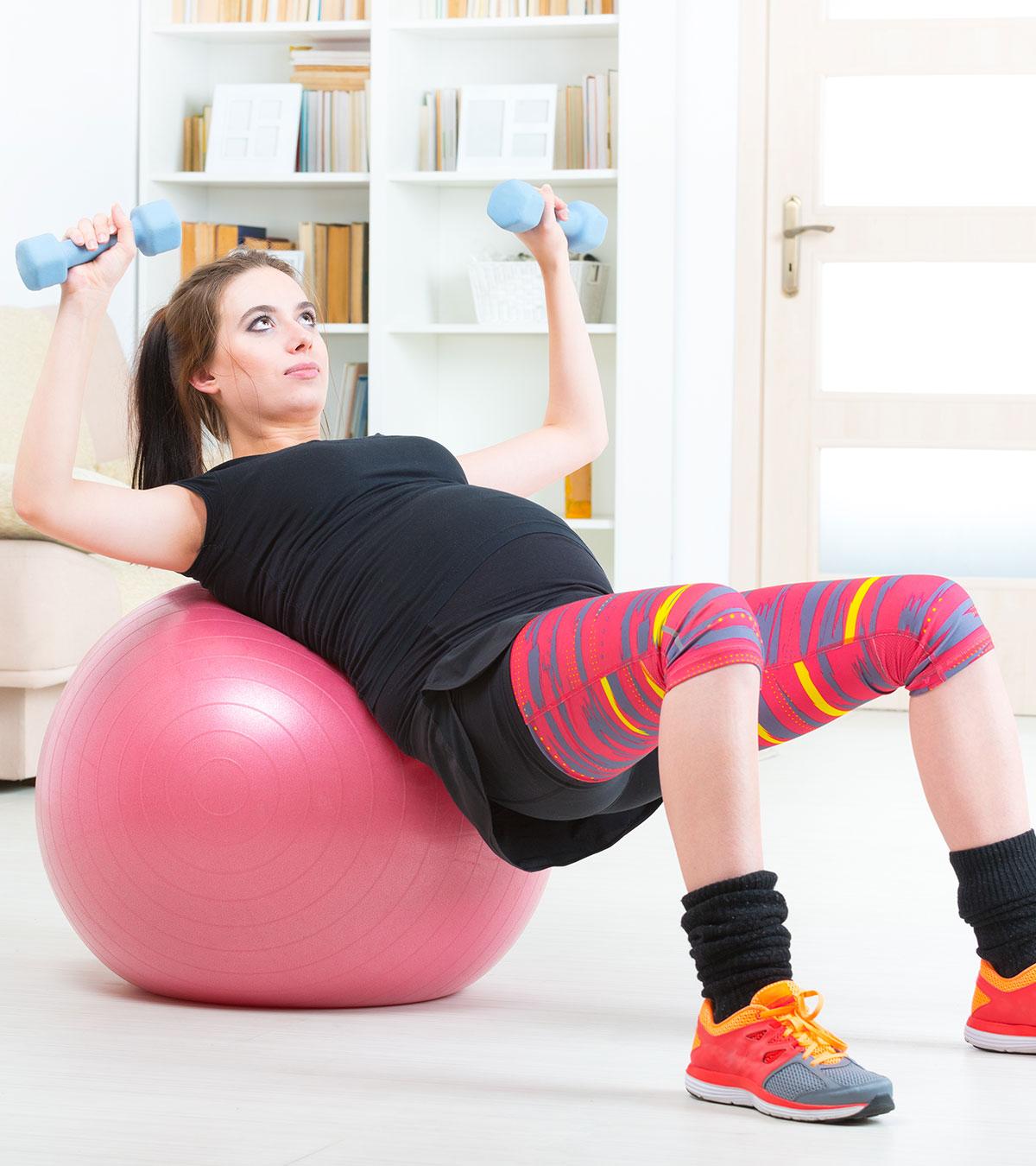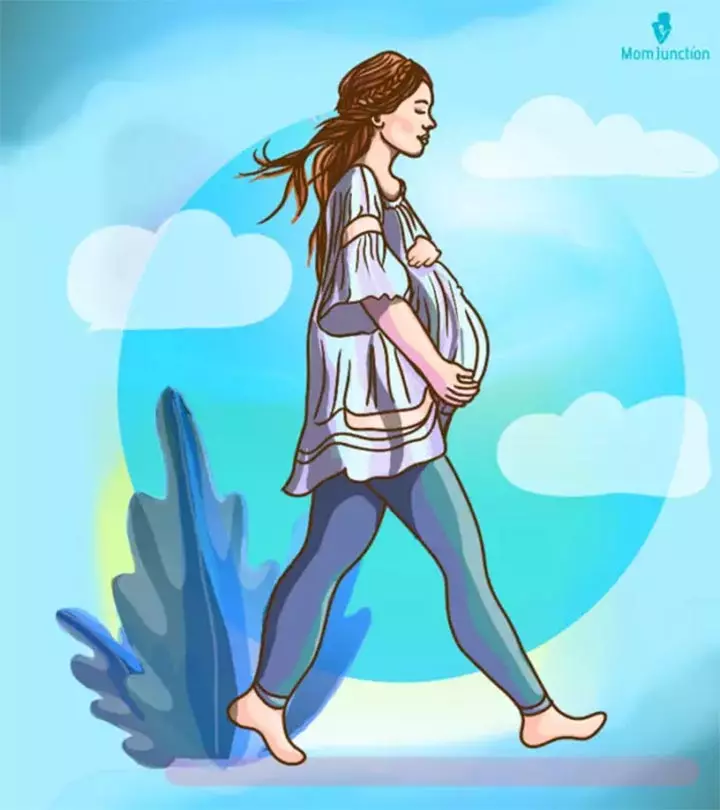
Walking during pregnancy is one of the safest and most effective ways to stay healthy. The activity is known to reduce the risks of pregnancy complications from inactivity or alarming weight gain.
According to doctor recommendations, women should do at least 150 minutes of light aerobic workouts, such as brisk walking, per week for a healthy pregnancy (1). Moreover, walking at a slow controlled pace is not known to cause pregnancy complications such as miscarriage, low birth weight, or preterm delivery (2).
However, although it is relatively safe, a doctor’s consultation for any form of exercise when pregnant is advisable. Read on to learn more about the benefits of walking for pregnant women and get some tips on safe walking in all three trimesters.
Key Pointers
- Walking is beneficial and considered safe during all pregnancy trimesters.
- It helps in reducing back pain, relieving constipation, preventing excess weight gain, and reducing the risk of gestational diabetes and preeclampsia.
- Pregnant women may choose to walk for 30 minutes daily at once or in 15-minute segments.
- It is vital to wear comfortable footwear, carry water, and take frequent breaks while walking.
- Pregnant women should stop walking if they feel any pain, dizziness, or discomfort and consult a doctor for guidance.
Benefits Of Walking During Pregnancy
Walking during pregnancy improves your fitness and strengthens your heart and blood vessels. Walking could also help you tone your muscles. The following are the possible benefits of walking during pregnancy (1) (2) (3) (4):
- Helps reduce back pain
- Helps relieve constipation
- Reduces the need for cesarean delivery (C section)
- Reduces the risk of gestational diabetes
- Reduces the risk of preeclampsia
- Helps prevent excess weight gain
- Reduces the risk of blood clots
- Promotes postpartum weight loss
- Reduces postpartum recovery time
- Reduces the risk of postpartum depression
, board-certified obstetrician-gynecologist from Brooklyn, New York, says, “Walking is a healthy, low-impact exercise during pregnancy. It can benefit circulation, pelvic strength, and core strength, among other things. Improved circulation, in particular, helps direct oxygen and nutrients from the placenta to support the baby’s growth and development.”
 Did you know?
Did you know?How Long Can You Walk When Pregnant?
It is recommended that you walk 30 minutes at a stretch or 15 minutes twice a day for five days a week (1).
Brisk walking or walking up a hill is considered a moderate activity. A short walk every day can be more comfortable than a long walk taken every few days.
How To Adapt To Walking During Pregnancy?
Although moderate pregnancy exercises are safe and beneficial, you may have to make a few modifications based on the anatomical and physiological changes in your body. The amount of walking that you should do depends on which trimester you are in.
If the weather is warm and humid, slow down your pace or choose other forms of exercise, such as swimming and prenatal yoga.
The following may help you to adapt to walking throughout the different phases of pregnancy:
- First trimester
Your approach to walking up to the first 12 weeks of pregnancy may vary based on your exercise habits prior to conception (2). Wear a comfortable pair of walking shoes. It will help you to avoid back pain and prevent you from falling.
If you have spotting or bleeding from the vagina, cramps in the abdomen or pelvisiA bone that protects and supports the abdominal organs. or a backache before or during your walks, stop walking and consult your gynecologist immediately.
 Quick tip
Quick tipBeginner
Try walking as long as you can, at a comfortable pace. You may increase the duration and intensity gradually over the trimester.
You may walk for 10 to 15 minutes on alternate days. Try to add five more minutes, if possible. This will help you to walk comfortably for 10–20 minutes for five days a week towards the end of the trimester.
Intermediate
You may walk for 20 minutes daily, four or five days a week. Towards the end of the first trimesteriThe period from conception till the 13th week of pregnancy. , you may walk for 20–30 minutes daily, by gradually increasing the intensity and duration. Plan your routine to meet the required 150 minutes of physical activity in a week.
Advanced
Although you are fit enough to walk for longer durations or to do intense workouts, it is advised to walk at a moderate pace during pregnancy. Walking for 20–30 minutes a day for five to six days a week could be ideal if you feel healthy. Do not work out beyond an RPE (Rating of Perceived Exertion)iA way of measuring the intensity level of a physical activity. of 7.
- Second trimester
During the second trimesteriThe period of pregnancy from the 14th week to the 27th week. , you should pay attention to the posture of your body while walking, to avoid straining your back. Keep your back straight and swing your arms for balance while walking.
Ensure you wear an appropriate pair of shoes for walking. Try a belly support band if you feel it is required.
After walking, take rest and keep your legs up to avoid swelling, which is common in the later stages of pregnancy.
Continue to walk for the same duration and at the same intensity as that of the first trimester.
Don’t walk if you feel you are spotting or bleeding from the vagina, experience a backache or crampy pain in the lower abdomen or if you feel excessive wetness or leaking from the vagina. Consult your doctor in such cases.
- Third trimester
You may continue your daily walking during the third trimesteriThe period of pregnancy from the 28th week to the time of delivery. as well. You should contact your doctor if you have back or pelvic pain while walking. Pain that increases in intensity, is repetitive and the duration between the pain decreases may be preterm labor and needs immediate consultation with your gynecologist.
Avoid steep and uneven walkways. Wearing a belly belt could support your pregnant belly. Try to walk a short distance twice a day rather than taking a long walk. Walking with a family member is advisable if you are nearing your due date so that you get emergency help if needed.
General Tips For Walking During Pregnancy
Your steps may become shorter due to the pregnant belly. If you feel it is difficult to hold a conversation while walking, consider slowing down and cover less distance. Do not walk to a point that you become tired.
The following precautions may help maintain maternal health and safety.
- Choose comfortable shoes: Wear a comfortable pair of shoes with a good grip to avoid falls. Always choose the correct size. You can also add a gel liner inside the shoes for better shock absorption.
- Protect your skin: Use sunscreen with SPF 30 or more if you are walking outdoors. Sun exposure may increase melasma (dark spots on the skin). Make sure the sunscreen is safe to use in pregnancy
- Hydrate yourself: Drink enough water to keep your body hydrated. It’s crucial to recognize the signs of dehydration in pregnancy, as they can impact both you and your baby. You may carry a water bottle if needed. Drinking cool water could make you stay cool during the workout and prevent dehydration.
- Eat before walking: Munch on a snack 30 minutes before walking. You may eat a banana, an apple, peanut butter, rice cakes, or smoothies. This could provide you with enough energy for walking. However, do not overeat.
- Choose an ideal place: You may walk indoors or outdoors. If it is humid, hot, or extremely cold outside, try walking indoors for your safety. You may use a treadmill at home. You can also choose a temperature-controlled shopping mall for your activity. If you prefer outdoor walking, morning hours are ideal. Be careful of puddles or flooding in the monsoon. In winter, be careful about ice on pathways. It is best to choose level ground and avoid walking in places with a high risk of falling, such as mountain hikes or uneven terrain.
 Quick tip
Quick tipSigns You Need To Slow Down
You should slow down or stop walking if you feel fatigued or tired. Although walking could benefit you during pregnancy, it should be done in moderation.
Slow down or stop walking if you experience (2):
- Exhaustion
- Shortness of breath
- Muscle or joint pain
- Bleeding or spottingiLight vaginal bleeding. per vaginum
- Backache, thigh, or lower lower abdominal pain
- A feeling of excessive wetness or leaking per vaginumiThrough the vagina.
Muscle and joint pain can get better after you rest for a day or two. Try walking slowly for a short duration after you feel healthy. If the pain persists, talk to your doctor, and try non-weight-bearing workouts, such as swimming.
When To Call The Doctor?
You should communicate any changes in your exercise routine or health to your primary healthcare provider to ensure your and your baby’s safety. Stop walking and call your doctor if you notice any of the following warning signs (1).
- Vaginal bleeding
- Dizziness
- Breathing difficulty before walking
- Chest pain
- Weakness of muscles
- Swelling or pain in calf muscles
- Uterine contractions
- Severe abdominal or pelvic pain
- Fluid leaks from the vagina
Frequently Asked Questions
1. Does walking induce labor?
Walking and staying upright could help in labor and delivery toward the end of pregnancy in some women. Walking helps the movement of the baby down to the birth canal. You may do it if your gynecologist advises you to but you should not walk a lot to induce labor. It could exhaust you, and you may be unable to push during delivery (5).
2. Does walking help with normal delivery?
Walking may increase the chance of normal delivery. Moderate prenatal exercises such as walking, swimming, or pregnancy yoga could help tone your muscles, which may help in normal delivery. Exercising could also help prevent gestational gestational diabetesiHigh blood sugar levels during pregnancy. (3).
3. Is it bad to walk too much during pregnancy?
Walking for a long duration may cause tiredness and body aches. There is no need to walk too much to benefit during pregnancy.
4. How many steps should a pregnant woman walk a day?
There is no need to count your steps to measure your physical activity. You may walk for 20–30 minutes if you are well-trained and healthy. If you are a beginner, try to walk for 10–15 minutes initially and gradually increase the duration.
5. Is it safe to walk on a treadmill while pregnant?
You can walk on a treadmill during pregnancy. However, it is not safe to run on it as it increases risk of falls. You may set the machine at a reasonable speed and hold the rails for support. Wear proper shoes for walking, and try to do some stretches before walking. Begin at a low speed, increase the pace gradually, and wind it up with a minute or two of slow walking.
6. Does walking during pregnancy cause foot problems?
Changes in the foot structure brought on by pregnancy include a sustained loss of arch height and rigidity, a significant drop in heels, and foot lengthening (9). Therefore, too much walking during pregnancy may result in foot and heel pain.
7. Can I walk during pregnancy if I am at the intermediate fitness level?
Yes. Walking is the best exercise recommended during pregnancy and is advised for anyone, irrespective of fitness level.
Walking during pregnancy could offer many health benefits to the mom-to-be and her unborn baby. While a 30-minute walk is recommended during pregnancy, it is better to take your doctor’s nod before choosing any walking method. Nonetheless, if you have an uncomplicated pregnancy, you may continue to walk until your delivery. Walking while pregnant could help prevent excess weight gain, diabetes, and preeclampsia; it also facilitates healthy birth weight in babies. You may go on regular short walks with your family or a group of expectant mothers. Moreover, walking also keeps you energetic, cheerful and motivated during pregnancy.
Infographic: Leg Strengthening Stretches For Pregnant Women
Indulging in some safe stretches before and after walking may reduce the risk of injuries such as muscle pull and cramps. Save this infographic to learn the leg stretches you can do during pregnancy. Illustration: Momjunction Design Team
Illustration: Health Benefits Of Walking During Pregnancy & Tips To Follow
Image: Stable Diffusion/MomJunction Design Team
Experience the benefits of an hour of brisk walking during pregnancy, fostering your health and well-being. Embrace this exercise routine through expert guidance in this video.
References
1. Physical Activity and Exercise During Pregnancy and the Postpartum Period; The American College of Obstetricians and Gynecologists
2. Exercise During Pregnancy; The American College of Obstetricians and Gynecologists
3. Christopher P. Connolly, et al.; Walking for health during pregnancy: A literature review and considerations for future research; The United States National Library of Medicine (2018).
4. Liu J, et al.; Does physical activity during pregnancy reduce the risk of gestational diabetes among previously inactive women?; The United States National Library of Medicine (2008).
5. Marit L. Bovbjerg, et al.; What Started Your Labor? Responses From Mothers in the Third Pregnancy, Infection, and Nutrition Study; The United States National Library of Medicine (2014).
6. Christopher P. Connolly et al.; Walking for health during pregnancy: A literature review and considerations for future research; National Center for Biotechnology Information (2019)
7. How to Handle Dizziness During Pregnancy; Nationwide Children’s Hospital
8. Exercise During Pregnancy; The American College of Obstetricians and Gynecologists
9. Neil A. Segal et al.; Pregnancy Leads to Lasting Changes in Foot Structure; American journal of physical medicine & rehabilitation; NCBI
Community Experiences
Join the conversation and become a part of our nurturing community! Share your stories, experiences, and insights to connect with fellow parents.
Read full bio of Dr. Akanksha Allahbadia Gupta
- Dr. Ila Dayananda, a board-certified obstetrician & gynecologist, most recently served as the chief medical officer for Planned Parenthood of Greater New York. She studied medicine and master's in Public Health at Northwestern University Medical School and then pursued an OB/GYN residency at the Beth Israel Deaconess Medical Center in Boston, MA. Dr. Dayananda holds a Family Planning Fellowship at Brigham and Women's Hospital/Harvard Medical School in Boston, MA.
 Dr. Ila Dayananda, a board-certified obstetrician & gynecologist, most recently served as the chief medical officer for Planned Parenthood of Greater New York. She studied medicine and master's in Public Health at Northwestern University Medical School and then pursued an OB/GYN residency at the Beth Israel Deaconess Medical Center in Boston, MA. Dr. Dayananda holds a Family Planning Fellowship at Brigham and Women's Hospital/Harvard Medical School in Boston, MA.
Dr. Ila Dayananda, a board-certified obstetrician & gynecologist, most recently served as the chief medical officer for Planned Parenthood of Greater New York. She studied medicine and master's in Public Health at Northwestern University Medical School and then pursued an OB/GYN residency at the Beth Israel Deaconess Medical Center in Boston, MA. Dr. Dayananda holds a Family Planning Fellowship at Brigham and Women's Hospital/Harvard Medical School in Boston, MA.
Read full bio of Dr Bisny T. Joseph
Read full bio of Rebecca Malachi
Read full bio of Aneesha Amonz







